商务词类转译
商务英语翻译词类转换
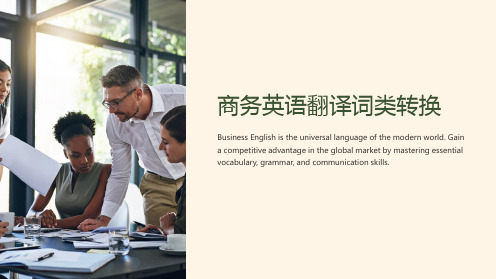
E-commerce and Online Business Vocabulary
"Can you clarify your point?" "I would like to add to that." "Let's move on to the next item on the agenda."
Travel & Accommodation
"I need to make a reservation." "What time is the flight?" "Is there a shuttle from the airport?"
Formal and Informal Business English
Adapting your language to the situation is essential for effective communication in different settings. Explore the differences between formal and informal language and learn to use each appropriately.
Conducting Presentations in Business English
商务英语之词类转译

第一PPT模板网,PPT素材下载,www.1ppt.c om/sucai/
Thanks!
第一PPT模板网,
译文:汤姆有口才,有风度,但很软弱 解析:句中的eloquent、elegant、soft表示汤姆的特 征,我们分别将其翻译成 口才、风度、软弱。
第一PPT模板网,PPT素材下载,www.1ppt.c om/sucai/
三、转译成汉语形容词
Hopefully, the task will be completed early this month.
商务英语翻译 之 词类转译
第一PPT模板,
转译成汉语动词
转译成汉语名词
词类转译
转译成汉语形容词
om/sucai/ ຫໍສະໝຸດ 一PPT模板网,PPT素材下载,www.1ppt.c
转译成汉语副词
一、转译成汉语动词
含有动作意味的名词转译成动词 The company gained 3 million dollars by t he sale of the land.
7
译文:那家公司卖掉了那块地,获利300万美元。
第一PPT模板网,PPT素材下载,www.1ppt.c
解析:句中的sale含有动作意味,我们将其翻译成 卖掉。
om/sucai/
二、转译成汉语名词
用来表示特征或性质的形容词转译成名词 Tom is eloquent and elegant—but soft.
译文:下月初完成这项工作是大有希望的。 解析:hopefully在这里是副词,将其翻译成名词更符 合汉语的表达习惯。
商务英语翻译-U6词类转换翻译法

2. Don’t be afraid of those who might have a better idea or who might even be smarter than you are.
不要恐惧那些想法可能比你高明,或者那些可能比你更聪 明的人。
3. Is Mr. Smith familiar with the performance of the laboratory equipment?
3.其它词类转译
5. He is the right man I’m looking for.
他正是我在找的人。
6. The unit of weight is the gram, that of length is the meter, and that of capacity is the liter.
1-①名词转译成动词 (n.---v. )
英语中具有动作意义的动作意义的名词,汉译时往往可转化为 动词。
1. They went on strike in demand of a 40 percent wage increase. 他们举行罢工,要求工资增加40%。 2. Give me liberty or give me death.
服从命令是军人的天职。
3. Many Western people are religious.
很多西方人/西方人多数都是虔诚的教徒。
3.其它词类转译
1. You are a greater blockhead than I had supposed you to be. 你比我所想象得要傻得多(n.—adj.) 2. Our government shows great concern for the Chinese resident abroad. 我国政府十分关心海外华侨。 3. His address impressed me deeply. 他的讲话给我留下很深的印象。 4. From the front, back and both sides we kept a strict watch on the enemy. 我们在前后左右严密地监视敌人。
76--商务英语翻译大二上学期chapter 6-8词类转化法,词义的引申,虚与实的转换-精选版
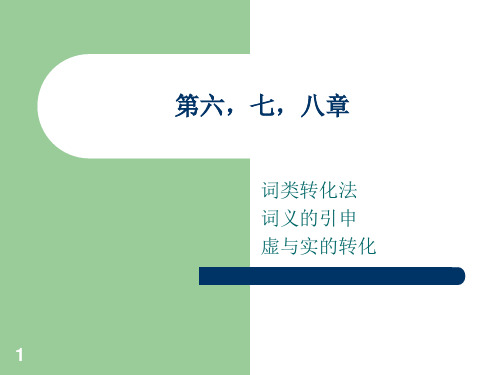
所谓逻辑引申,是指在翻译的过程中,由于直 译某个词、短语乃至整个句子会使译文不通顺 以及不符合目的语的表达习惯,因而就要根据 上下文的逻辑关系,对该词、短语或整个句子 从其基本意义出发,由表及里,运用符合目的 语习惯的表现法,选用确切的词句,将原文内 容的实质准确地表达出来。
12
13
Our unique concept was a response to buyer needs, bringing greater reliability, higher-quality output, exceptional userfriendliness and operational ease. 译文:我们唯一的信念就是要适应购买者的需 要,生产更可靠的、质量更高的产品,让使用 者感到格外好用和操作方便。 析: 原文中的was a response to本来的 意思是“是对…做出的反应”,如果直译就会 使得译文不符合译语表达习惯,因此就需要做 出引申,将其翻译成“适应”就顺畅了。
6
2形容词转译成动词 adjectives converted into verbs
We are especially grateful to you for arranging the meeting for us with the Machinery Trading Delegation at such short notice. 译文:我们特别感谢你们在时间那么短促的情 况下安排我们同机械交易团的成员们会面。 析: 原文中的grateful是与情感有关的形容 词,翻译成汉语时要译成动词。
3
A commonplace criticism of American culture is its excessive preoccupation with material goods and corresponding neglect of the human spirit. 译文:人们普遍批评美国文化过于强调对于物 质产品的占有而相应地过于忽视人们的精神生 活。
商务英语翻译-U6词类转换翻译法

将动词转化为复数名词形式,例如: inspire → inspirations。
动词到形容词的转换方法
1 加后缀
通过添加形容词后缀(如-ful,-less,-able)将动词转换为形容词,例如:stress → stressful。
2 使用过去分词
将动词的过去分词形式用作形容词,例如:interested → interesting。
形容词到名词的转换方法
加后缀 名词化 具体化
通过添加名词后缀(如-ity,-ism,-ness)将 形容词转换为名词,例如:difficult → difficulty。 使用形容词表示人、事件或事物的名称,例如: important → importance。
将形容词表示的抽象概念具体化,例如: brave → bravery。
名词+形容词
通过名词与形容词的组合形式 转换,例如:market research → market-oriented。
动词到名词的转换方法
1
增加介词短语
2
在动词后面增加介词短语以转换为名
词,例如:write → writing an email。
3
名词化
通过将动词转化为名词形式,例如: promote → promotion。
重新选择词性
将名词解释为动作或过程,使其成为动词,例如:communication → communicate。
名词到形容词的转换方法
形容词类别
通过选择适当的形容词词性进 行转换,例如:knowledge → knowledgeable。
形容词短语
使用适当的形容词短语表达特 定的含义,例如:business plan → strategic。
商务英语翻译7.2词性转换、词的增减[精]
![商务英语翻译7.2词性转换、词的增减[精]](https://img.taocdn.com/s3/m/cb04ab2a6bd97f192279e93a.png)
词性转换
4. 转译成副词 英语句子中的名词和形容词在汉译时都可根据具体
情况转译成汉语的副词,动词也可以在一定语境下转译成 副词。 例1 We must make full use of exiting technical equipment. 我们必须充分利用现有的技术设备。(形容词转译为副词) 例2 Direct marketing on the Internet needs to be conducted with particular care. 网上直接营销需要特别小心地进行。(形容词转译为副词)
词性转换
2. 转译成名词
例2 The report concluded: Our research confirms that Britain’s long-hours culture is seriously undermining the quality of life. We must challenge this culture, for everyone’s sake.
第七章
词性转换、词的增减
词性转换
词性转换是英汉翻译中常见的翻译方法。 很多词语按原来词性翻译在译语中很难表达, 或者表达起来显得生硬、晦涩,不符合译语表 达习惯,往往在翻译中需要变通,进行词性转 换。
词性转换
1. 转译成动词 英语中具有动作意义的名词、介词汉译时往往
可转化为动词,形容词和副词也可以适当地转译 成动词,英语中起名词作用的动名词,汉译时也 可以译为动词。
词性转换3. 转译成形容源自 英语中有些名词在汉译时可以转译成形容词,把
英语中的副词译成汉语中的形容词也很常见,偶尔也 可以见到英语中动词汉译时转译成形容词的情况。 例1 He has great trouble in doing the work on his own. 他独自干这活非常困难。(名词转译为形容词) 例2 The potential fruits of this strategy are most obviously commercial. 这一战略最明显的潜在成果是商业上的。(副词转译 为形容词)
商务英语的翻译技巧
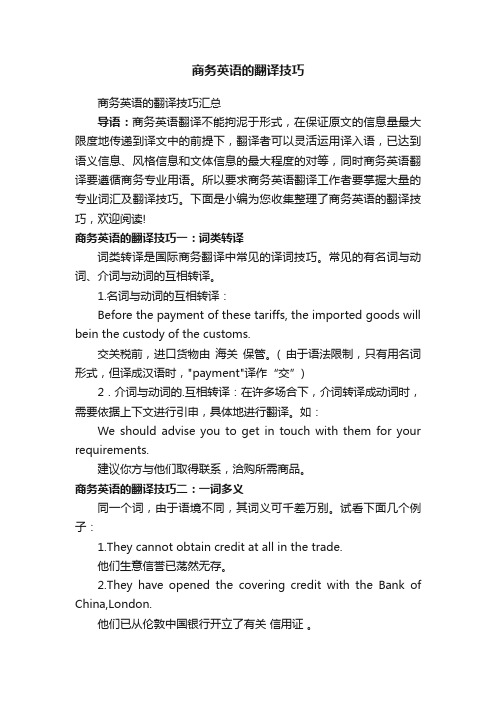
商务英语的翻译技巧商务英语的翻译技巧汇总导语:商务英语翻译不能拘泥于形式,在保证原文的信息量最大限度地传递到译文中的前提下,翻译者可以灵活运用译入语,已达到语义信息、风格信息和文体信息的最大程度的对等,同时商务英语翻译要遵循商务专业用语。
所以要求商务英语翻译工作者要掌握大量的专业词汇及翻译技巧。
下面是小编为您收集整理了商务英语的翻译技巧,欢迎阅读!商务英语的翻译技巧一:词类转译词类转译是国际商务翻译中常见的译词技巧。
常见的有名词与动词、介词与动词的互相转译。
1.名词与动词的互相转译:Before the payment of these tariffs, the imported goods will bein the custody of the customs.交关税前,进口货物由海关保管。
( 由于语法限制,只有用名词形式,但译成汉语时,"payment"译作“交”)2 . 介词与动词的.互相转译:在许多场合下,介词转译成动词时,需要依据上下文进行引申,具体地进行翻译。
如:We should advise you to get in touch with them for your requirements.建议你方与他们取得联系,洽购所需商品。
商务英语的翻译技巧二:一词多义同一个词,由于语境不同,其词义可千差万别。
试看下面几个例子:1.They cannot obtain credit at all in the trade.他们生意信誉已荡然无存。
2.They have opened the covering credit with the Bank of China,London.他们已从伦敦中国银行开立了有关信用证。
以上两个句子credit 词义都有所区别。
商务英语的翻译技巧三:词义引伸在商务英语翻译中,有时会遇到某些词在词典上难以找到贴切具体上下文词义,如生搬硬套,译文往往语意不清,甚至导致误解。
76--商务英语翻译大二上学期chapter 6-8词类转化法,词义的引申,虚与实的转换-精选版精选版
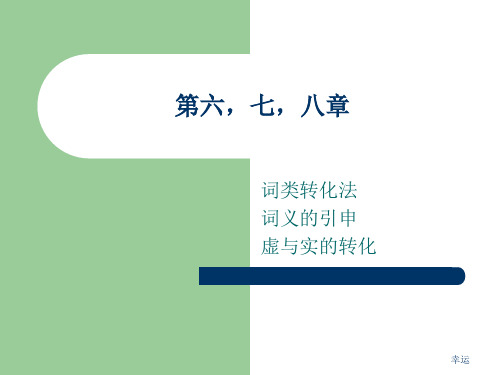
ll services in business—such as gift wrapping, delivery and credit—have some amount of costs associated with them, and these costs must be covered by higher prices. 译文:商业中所有的服务——诸如礼品包装、 送货以及赊账——都有相应的成本,而这些成 本要靠较高的价格来弥补。 析: cover一词在英语中的意思是“包括, 包含,覆盖”,这里选取任何一个意义来翻译 本例句中cover一词都无法充分再现原文的意 幸运 义。将该词引申为 “弥补”才符合地道的汉
幸运
How they bow to that Cleole because of her hundred thousand pounds!
幸运
4概念范围的调整 adjustment of conceptual category
Poetry suffers in translation—and the reader suffers with it. 译文:诗歌经过翻译就要遭殃——诗歌遭殃, 读者就要跟着受罪! 析: 前一个suffers的外延大而内涵小,后一 个suffers的外延小而内涵大。
In fact, one mould can produce many thousands of articles before it wears out.
译文:事实上,一个模子生产成千上万件产品 之后才会破坏。 析: before被翻译称汉语中的“之后才”, 符合汉语的逻辑顺序和表达。
幸运
商务英语翻译3词类转换正说反译与反说正译ppt省名师优质课赛课获奖课件市赛课一等奖课件

4. 其他词转换成副词
4.1.英语名词译成汉语动词时, 修饰 该名词旳形容词转译成汉语旳副词。
▪ Warm discussion arose on every corner as to his achievements.
▪ 到处于热烈地讨论他旳成就。 ▪ We took brief, restless naps, struggled to
些介词在汉译时往往译成动词。如:
▪ The judge sat in the dining room amid (处理)his morning mails.
▪ Carlisle Street runs westward(向西延伸), across (越过) a great black bridge, down (爬下)a hill and up(爬上) again, by (经过)little sloops(单桅船) and meat markets, past (路过)single storied homes, until suddenly it stops against a wide green lawn.(…冲着一大片绿色草地中断 了。)
3. 其他词转换成形容词
3.1.形容词派生旳名词转译成形容词 ▪ Security and warmth of the cabin of a ship
were wonderful. ▪ 船舱很安全也很温暖,好极了。 ▪ The pallor( n.苍白,灰白,)of her face
indicated clearly how she was feeling at the moment. ▪ 她苍白旳脸色清楚地表白了她那时旳情绪。
76--商务英语翻译大二上学期chapter 6-8词类转化法,词义的引申,虚与实的转换

The voyage was a smooth one. The wind is favorable and the weather fair. 译文:一路上非常顺利,风是顺风,天气是晴好的天 气。 析: 这里将favorable翻译成“顺风”、将fair翻译 成“晴好的天气”是考虑到了汉语的通顺表达。如果 将favorable翻译成“有利的”,将fair翻译成“晴朗 的”,则不能够再现原文信息。这里,译文一方面将 形容词转换成名词,从而使得汉语译文更通顺,另一 方面通过重复“风”和“天气”使得原文的意思得到 了强调。
2形容词转译成动词 adjectives converted into verbs
We are especially grateful to you for arranging the meeting for us with the Machinery Trading Delegation at such short notice. 译文:我们特别感谢你们在时间那么短促的情 况下安排我们同机械交易团的成员们会面。 析: 原文中的grateful是与情感有关的形容 词,翻译成汉语时要译成动词。
4概念范围的调整 adjustment of conceptual category
Poetry suffers in translation—and the reader suffers with it. 译文:诗歌经过翻译就要遭殃——诗歌遭殃, 读者就要跟着受罪! 析: 前一个suffers的外延大而内涵小,后一 个suffers的外延小而内涵大。
A commonplace criticism of American culture is its excessive preoccupation with material goods and corresponding neglect of the human spirit. 译文:人们普遍批评美国文化过于强调对于物 质产品的占有而相应地过于忽视人们的精神生 活。
商务英语词类转换
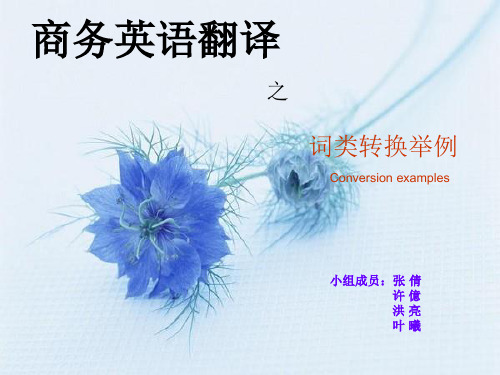
分析: 分析: 句中“ 是由动词派生的名词, 句中“maintenance”是由动词派生的名词,在转译是可转译为动词。 是由动词派生的名词 在转译是可转译为动词。 它在句中名词所表达的本意是“维护,维持” 但翻译时将它译为动词“ 它在句中名词所表达的本意是“维护,维持”,但翻译时将它译为动词“支持 更能表达其意义。 更能表达其意义。
商务英语翻译
之
词类转换举例
Conversion examples
小组成员: 小组成员:张 倩 许億 洪亮 叶曦
1.The company gained $3 million by the sale of the lot.
分析: 分析: 本句中“ 为名词, 销售,出售”的意思,而在英语中“ 本句中“sale”为名词,为“销售,出售”的意思,而在英语中“具备动态 为名词 概念的名词+of+名词”这种结构在翻译成汉语时,几乎全部都可以将“具备 名词” 概念的名词 名词 这种结构在翻译成汉语时,几乎全部都可以将“ 动态概念的名词”翻译成动词,属于英语名词转汉语动词。 动态概念的名词”翻译成动词,属于英语名词转汉语动词。故,“sale”在这 在这 里应该翻译为动词“ 的意思。 里应该翻译为动词“卖”的意思。
商务英语翻译(英译汉)第二版电子教案第6单元

英汉动态与静态的差异
英汉词性一个重要差异在于,英语中名词占优势,汉语动 词占优势。
连淑能认为,名词化是英语常见的现象,名词可以用来表 达原来属于动词或形容词所表达的概念,如用抽象名词表 达动作、行为、变化、状态、品质、情感等概念。名词的 优势在于常常可以使表达比较简洁,造句比较灵活,行文 比较自然,便于表达较为复杂的思想内容。
教材:由于时刻担心货币兑换率最近不稳 定,中央银行决定调高其动性目标的上限。
试译:由于最近货币兑换率不稳定,中央 银行对此深为关切,于是决定提高其动性 目标的上限。
5
Long term interest rates have soared almost fourfold in the past three months as a result of plunges in the government bond market.
2
A developing economy with an impressive development plan requires large imports of capital goods, technology, raw materials and other inputs and consumer goods to carry out the plan effectively.
教材:奥巴马强调,他会保持美元的强劲势 头的,以便吸引海外机构到美国投资。
试译:奥巴马强调,为了吸引外资, 他将保持美元坚挺。
8
As you are aware that the British Electrical& Allied Manufacturer’s Association is the organization that represents the many firms in the sector of British industry which manufactures equipment for the generation, transmission, distribution and utilization of electrical power.
商务词类转译

商务词类转译词类转换是翻译中常见的技巧。
就商务英语翻译而言,最常见的是名词、介词、形容词及动词间的互相转译。
一、名词与动词的互相转译研究表明:英语的名词在词汇中占有绝对优势,常用名词来表达汉语中用动词表达的概念(如抽象的行为名词) ,而且动词的兼类情况非常明显,加之英语有词形变化, 许多动词词尾加上后缀, 如-ment , - tion , - ance , - er , - or 等,即可变成名词。
相反,汉语却以动词占优势,而且一个句子不限于用一个动词,可以几个动词连用。
因此,英译汉时许多名词可译成汉语的动词;汉译英时动词也常译成名词(或介词+ 名词) 。
英语中具有抽象动作意义的名词汉译时常译成动词。
(1) The repeal of the Corn Laws by Great Britain in 1846 ended Britain′s long - standing policy protectionism.1846 年英国废除《谷物法》,结束了英国长期存在的贸易保护主义政策。
(2)And in a best - selling book ,Lester Thurow told us that America would soon be going head together with a Germanled Europe in the struggle for world markets.莱斯特·瑟罗在他的一本畅销书中断言,美国不久将要与德国领导的欧洲势均力敌地争夺国际市场。
原文中“struggle”为介词“in”的宾语,但汉语译文直接将它译成动词“争夺”,比原文来得更直接更传神。
(3) The first was the belief among many national leaders that the events leading to the Second World War were triggered by the Great Depression of the1930s,which in turn was believed to have been prolonged and deepened by the very high tariffs enacted by virtually all of the major trading nations during the early 1930s.有时在英译汉时,如将名词译成动词,则更易于处理。
76--商务英语翻译大二上学期chapter 6-8词类转化法,词义的引申,虚与实的转换-精选版

3
A commonplace criticism of American culture is its excessive preoccupation with material goods and corresponding neglect of the human spirit. 译文:人们普遍批评美国文化过于强调对于物 质产品的占有而相应地过于忽视人们的精神生 活。
A developing economy with an impressive development plan requires large imports of capital goods, technology, raw materials and other inputs and consumer goods to car~ out the plan effectively. 译文:一个具有宏伟发展计划的发展中国家, 为了有效地实施其发展计划,可能需要大量进 口资本货物、技术、原材料和消费品及其他产 品。
15
ll services in business—such as gift wrapping, delivery and credit—have some amount of costs associated with them, and these costs must be covered by higher prices. 译文:商业中所有的服务——诸如礼品包装、 送货以及赊账——都有相应的成本,而这些成 本要靠较高的价格来弥补。 析: cover一词在英语中的意思是“包括, 包含,覆盖”,这里选取任何一个意义来翻译 本例句中cover一词都无法充分再现原文的意 义。将该词引申为 “弥补”才符合地道的汉
商务英语翻译词类转换

LOGO
LOGO
小组成员:
向存程 张是指英语中的某一词类译成汉语 时转换成另一词类,可以说是翻译中最常用 的手段。由于英汉两种语言的表达方式不同
,不少句子在翻译时不能采取逐词对译的手
法。相反,原文中的一些词在译文中只有词
类转换,才会显得自然通顺。
转换成动词
英语中的“be+形容词”的系表结构可以被转 我方希望你方会认真考虑商业信 换成汉语中的动词。as a result of是介词
誉并立即开出信用证,否则,由 转译成动词。 此造成的所有损失将由你方负责。
In consideration of the friendly relations between us, we are ,as an exceptional case, prepared to accept payment for your trial order on D/P basis. Consideration: 名词短语含有动作意味, 考虑到彼此的友好关系,对你方这批 转译为动词,译为“考虑到” 试购的货物我们准备破例接受付款交 Exceptional: 形容词相应地转译为副词, 单的方式付款。 译为“破例”
The security of buying the products of the world famous business companies was wonderful.
由形容词派生的名词转译成汉语的形容 购买世界著名商务公司的产品很安全, 词。
这种感觉好极了。
unit1商务翻译
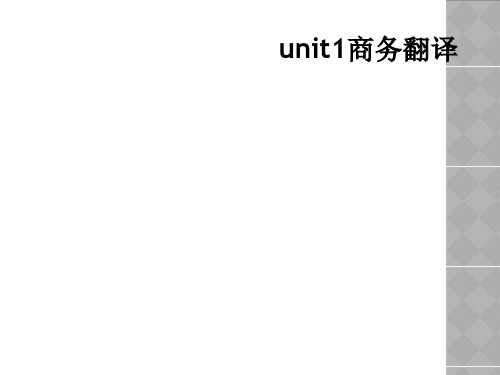
一、名词的词类转译—名词译成动词
We learn that you have been dealers of Chinese products for many years.
据我们了解,贵公司经营中国产品已有
多年历史。 We are exporters of the above goods,
Sec 4 (1)I am writing to complain about the wrong delivery of
my No. 3 order.
Sec 6
译文:我写此函向贵公司投诉你错发给我方的3号订货。
Sec 7 (2)The airline has been in operation for many years.
译文:他跟供货商进行了例行的联络,催促发货。
Sec 7
Sec 8
返回
四、副词的词类转译— 副词转译成形容词
Securities laws require companies to treat all shareholders reasonably equally.
证券法要求所有的公司给所有的持股人 既
great progress in economy.
Sec 7 译文:我们很高兴地看到,中国的经济已经取得了很大
的发展。
Sec 8
返回
二、形容词的词类转译—形容词译成动词
英语中表示知觉、欲望等心理状态的形容词,在系动词后 Sec 1 作表语时,往往可以译成动词。如:confident, certain,
译文:在该地区进行投资,全面的调查是绝对必要的。
Sec 6 (2)The originality of the design was amazing.
商务英语名词化汉译的词类转换技巧

商务英语名词化汉译的词类转换技巧商务英语名词化汉译的词类转换技巧词类转译是商务英语英汉翻译中常见的译词技巧,并且是英汉互译翻译实践中的重要手段之一。
下面是店铺分享的商务英语名词化汉译的词类转换技巧,欢迎大家阅读!一、问题和分析(一)商务英语汉译中存在的问题商务英语翻译课程是高职高专英语专业外贸和商务方向的核心课程之一。
“当今世界经济日益全球化,社会需要的人才是既懂英语又通晓商务知识的复合型应用人才,而商务英语翻译作为沟通中外经济、文化等的手段,其重要性更是不言而喻”。
名词化在商务英语中大量运用,体现了商务英语的文体特点。
但是由于商务英语中的名词化汉译难度较大,造成商务英语中文译文生硬、难懂,很难体现原文的文体特征。
(二)问题分析在我国,各个领域的专家学者对翻译标准的探讨从来没有间断过。
近代严复的“信、达、雅”标准,现代鲁迅的“力求易解”、“保存原作的风姿”标准,茅盾的“艺术创造性翻译”标准及傅雷的“神似”、钱钟书的“化境”等标准,都对翻译界产生过强烈的影响。
在各种翻译的标准和原则中,严复提出的“信、达、雅”最为广为人知。
在商务英语翻译的过程中译者应该做到对译本的信、达,即忠实、准确和通顺。
由于商务英语文本往往比较正式,修辞等也有约定俗成的表达,因此“雅”不作为商务英语翻译原则和标准的必需要求,除了一些特殊文本,如广告英语外,其他的文本翻译能雅则雅。
商务英语翻译中可以运用泰特勒的“翻译三原则”:第一,译作应完全复写出原作的思想;第二,译作的风格和手法应和原作属同一性质;第三,译作应具备原作所具有的通顺作为指导标准。
商务英语专业性强、逻辑严密、表达要求简练。
由于具有格式化、规范性的语言特点要求,商务英语的翻译自然不能像文学作品如诗歌等的翻译一样优美。
忠实原则要求,译文在意义和风格方面要忠实于原文,把原文完整而准确地表达出来,不随意进行改动、歪曲和增减;而通顺原则则要求译文通顺易懂,流畅自然,符合汉语的表达习惯,没有逐词死译、硬译的现象。
[精品]商务英语翻译词类转换
![[精品]商务英语翻译词类转换](https://img.taocdn.com/s3/m/92d5d4505acfa1c7aa00ccce.png)
2.省略宾语 • —Do you know Mr. Li ? — I don’t know (him) 3.省略表语 • ——Are you thirsty ? —— Yes,I am (thirsty) 4.同时省略几个成分 • —Are you feeling better now?你觉得好些了吗? —(I am feeling ) Much better (now) 好多了。
(4)汉语里一个复杂思想,往往分成几个短 句来表示。各短句之间的联系,有时靠“意 合”,有时靠重复。这样才能承上启下,衔 接自然。 他这样教发音简直是误人子弟,误人还误得不浅。
(5)由于修辞上的需要。英语中的重复多数是为了修辞, 起强调作用。汉语的重复,即使是为修辞,也不单一地为 了强调。有时是为了排比整齐,有时为了推理层递,有时 为了对偶工整,有时为了条理清楚。 我们今天开这个大会,就是为了继续团结,继续进步。 (排比) 这种作风,拿了律己,则害了自己;拿了救人,则苦了别 人。(推理层次)
5.2 汉语重复表达的特点
重复是汉语的一个明显特点,汉语的重复 不仅有语音上的需要,还有语法与修辞上的 需要。 • (1)汉语第三人称“他”、“她”、“它”的发音同为 /ta:/。汉语很少用指物的“它”,而是习惯重复原词,或借 助指示代词。 • (2)汉语有一种连锁句,其中很多需要重复词语的。 有什么吃什么,有米饭吃米饭,有馒头吃馒头。 • (3)汉语的选择疑问句常常需要重复动词。 努力提高呢?还是努力普及呢?
5.3 英语翻译中的重复翻译法
Marketing is a pervasive social activity that goes considerably beyond the selling of toothpaste, soap, and steel.
商务英语翻译词类转译初探
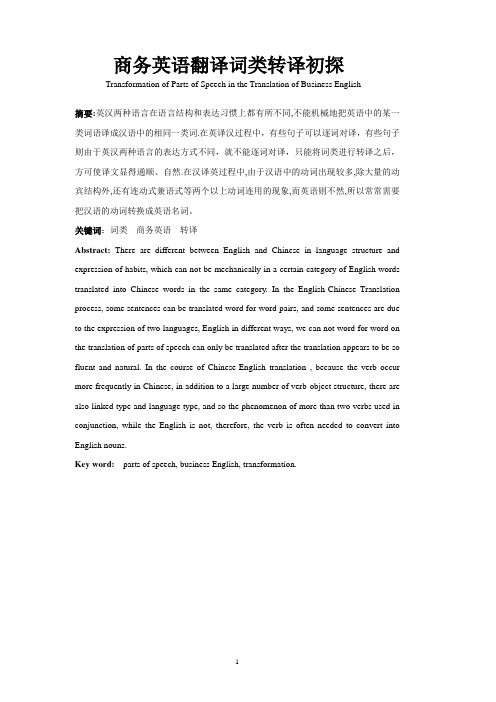
商务英语翻译词类转译初探Transformation of Parts of Speech in the Translation of Business English摘要:英汉两种语言在语言结构和表达习惯上都有所不同,不能机械地把英语中的某一类词语译成汉语中的相同一类词.在英译汉过程中,有些句子可以逐词对译,有些句子则由于英汉两种语言的表达方式不同,就不能逐词对译,只能将词类进行转译之后,方可使译文显得通顺、自然.在汉译英过程中,由于汉语中的动词出现较多,除大量的动宾结构外,还有连动式兼语式等两个以上动词连用的现象,而英语则不然,所以常常需要把汉语的动词转换成英语名词。
关键词:词类商务英语转译Abstract: There are different between English and Chinese in language structure and expression of habits, which can not be mechanically in a certain category of English words translated into Chinese words in the same category. In the English-Chinese Translation process, some sentences can be translated word for word pairs, and some sentences are due to the expression of two languages, English in different ways, we can not word for word on the translation of parts of speech can only be translated after the translation appears to be so fluent and natural. In the course of Chinese-English translation , because the verb occur more frequently in Chinese, in addition to a large number of verb-object structure, there are also linked type and language type, and so the phenomenon of more than two verbs used in conjunction, while the English is not, therefore, the verb is often needed to convert into English nouns.Key word:parts of speech, business English, transformation.IntroductionBusiness English informs business information, such as theory and practicality...etc., its vocabulary profession is the strongest; the language norm is formal, simple, direct and clearly. Business English translating with "accuracy, intuitive, literary" three principles. Because the structure and custom of language are greatly different, we have to understand the characteristic of vocabulary and the language’s structure of Chinese and English, it’s the only way to carry on phrase to translate properly.English and Chinese are different in the linguistic structure and expression of habits, it can not be mechanically translated into Chinese words in the same category, such as the Chinese noun translated into English noun, the verb translated into Chinese verb, etc., it seems often make a Chinese translation does not fluent, and sometimes even seem lame in the English-Chinese translation, some sentences can be word for word to get right translation, and some sentences are due to the expression of two languages, English is in different ways, we can not translate word for word on the translation of part of speech ,it is the only way that could let translation appears to be fluent and natural.Thus, in English translation, it should be in accordance with the context of the expression of ideas and need to convert the nature of parts of speech.1.English to Chinese1.1 Verbs Transformed into NounsEnglish verbs and other terms are translated into Chinese nouns. In Business English, are often encountered in the original English, some verbs or some adjectives, according to Chinese language habits, they must be translated in the terms, only in this way to get fluent translation. For examples:1. The large cities absorb the wealth and fashion of the nation.大都市是一国的财富集中之地.2. Formality has always characterized their relationship.他们之间的关系有一个特点,就是以理相待.the verb "absorb", "characterized" are translated as "gathering place", "characterized by" more in line with the Chinese language habits, more easily acceptable to people.3. The film impressed me deeply.这部电影给我留下了深刻的印象.4. He routinely radioed another agent on the ground.他跟凌夷个地勤人员进行了例行的无线电联络.5. I have always wondered at the passion many people have of going abroad.我在想,为什么许多人对出国如此热衷?6. As he is a perfect stranger in the city, I hope you will give him the necessary help.他对这座城市完全陌生,所以我希望你能给他必要的帮助.7. The President had prepared meticulously for his journey.总统为这次出访作了十分周密的准备。
- 1、下载文档前请自行甄别文档内容的完整性,平台不提供额外的编辑、内容补充、找答案等附加服务。
- 2、"仅部分预览"的文档,不可在线预览部分如存在完整性等问题,可反馈申请退款(可完整预览的文档不适用该条件!)。
- 3、如文档侵犯您的权益,请联系客服反馈,我们会尽快为您处理(人工客服工作时间:9:00-18:30)。
商务词类转译
词类转换是翻译中常见的技巧。
就商务英语翻译而言,最常见的是名词、介词、形容词及动词间的互相转译。
一、名词与动词的互相转译
研究表明:英语的名词在词汇中占有绝对优势,
常用名词来表达汉语中用动词表达的概念(如抽象的行为名词) ,而且动词的兼类情况非常明显,加之英语有词形变化, 许多动词词尾加上后缀, 如-ment , - tion , - ance , - er , - or 等,即可变成名词。
相反,汉语却以动词占优势,而且一个句子不限于用一个动词,可以几个动词连用。
因此,英译汉时许多名词可译成汉语的动词;汉译英时动词也常译成名词(或介词+ 名词) 。
英语中具有抽象动作意义的名词汉译时常译成动词。
(1) The repeal of the Corn Laws by Great Britain in 1846 ended Britain′s long - standing policy protectionism.
1846 年英国废除《谷物法》,结束了英国长期存在的贸易保护主义政策。
(2)And in a best - selling book ,Lester Thurow told us that America would soon be going head together with a Germanled Europe in the struggle for world markets.
莱斯特·瑟罗在他的一本畅销书中断言,美国不久将要与德国领导的欧洲势均力敌地争夺国际市场。
原文中“struggle”为介词“in”的宾语,但汉语译文直接将它译成动词“争夺”,比原文来得更直接更传神。
(3) The first was the belief among many national leaders that the events leading to the Second World War were triggered by the Great Depression of the1930s,which in turn was believed to have been prolonged and deepened by the very high tariffs enacted by virtually all of the major trading nations during the early 1930s.
有时在英译汉时,如将名词译成动词,则更易于处理。
例如:
(4 ) Early hopes that Eastern Germany could stage an economic miracle like that of West Germany in the 1950s and ′60s have faded.
统一之初指望东德能重演西德五六十年代经济奇迹的热情早已淡化。
本例说明了在东西两德统一初期,人民迫切希望东德的经济会迅速崛起。
但是,随着时间的推移,
人们已不再那样强烈地对此抱有幻想。
原文“hope”用复数, 但汉语中没有数的变化。
如将原文的“hope”译成名词,首先汉语动宾不搭配,我们平常不讲“希望淡化”,其次原文复数形式不好处理。
但将“hope”译成动词后,后边再添加“热情”一词来体现原文的预期,译文则更加自然。
(5)由动词加- a (e) nce , - tion , - ment 等词缀构成的名词,英译汉时常译成动词。
例如:
Resistance to market opening is basically a power play by leaders of industry.
抵制开放市场基本上是工业领袖们的实力较量。
(6) Utility is therefore related to our decision about priorities in production - particularly in a cent rally - planned economy.
因此,效用(经济术语) 对我们决定优先生产什么是有关系的,特别在中央计划经济中尤其如此。
(7)Much of the remainder of the GATT is designed to prevent evasion of the tariff obligations of Article II by the use of nontariff barriers.
例中的“decision”、“production”皆为介词宾语,前者如用“decide”则与“priorities”动宾搭配不当,所以不宜用动名词形式;“in production”指一种过程,“produce”为及物动词,一般要跟宾语。
所以,也不适宜使用动名词。
第7 例中的“evasion”前为及物动词“prevent”,它的基本用法是“prevent sb. (f rom) doing sth. ”。
“evasion of tariff obligations ”这一结构却是动宾关系,也不适合用动名词。
(8)Before the payment of these tariff s, the imported goods will be in the custody of the customs and storage charges are for the impor ter’s account .
交关税前,进口货物由海关保管,存储费由进口商负担。
(9) In reimbursement of these extra expenses, please draw on us.
请开汇票向我方支款,用于偿付这些额外费用。
上两例均由于语法限制,只有用名词形式,但译成汉语时,“payment”和“reimbursement ”分别译作“交”和“偿付”。
二、介词与动词的互相转译
英语介词是英语中非常重要的一种“功能词”
(functional words) ,用于表示词与词之间的语法关系,组成一些语法结构。
英语介词不仅数量多(大约280 多个) ,而且与其他词类的搭配灵活(名词、代词、动名词、从句均可作它们的宾语,个别介词后还可跟形容词) ,词汇意义丰富。
而汉语的介词大部分是由动词虚化而来的,许多介词仍兼有动词词性,因此汉译英、英译汉时应时刻注意两者的区别,正确地加以处理。
例如,在“他在教室里”一句话中,“在”
是动词,译成英语时要用“系动词+ 介词短语”这种结构,译作He is in the classroom。
此外,之所以说英语介词具有丰富的词汇意义,
是因为它们由于搭配不同,其意义也不相同,而且可以表达汉语中常用动词来表达的意义。
因此,英汉互译过程中,两种语言的介词和动词常可以互相转译。
为说明这一点,请看下面各例:
(1) We should advise you to get in touch with them for your requirement s.
建议你方与他们取得联系,洽购所需商品。
(2) Bill Clinton’s first 100 days will be fill ed with momental battles over the budget deficit and health care reform.
比尔·克林顿上任后的头100 天里将充满削减预算赤字和推行医疗费用改
革的激烈战斗。
(3) But when the smoke clears , he’s likely tolook up and find himself staring at another giant challenge - fending off a new round of international t radewars and , perhaps , pressure for protectionism athome.
但是,当硝烟散尽,他可能发现自己正面临另一场巨大的挑战———新一轮国际贸易战,也许还有国内要求实行贸易保护主义的压力。
从上面各个译例来看,在许多场合下,介词转译成动词时,需要依据上下文进行引申,具体地进行翻译。
至于译者能否恰当地将汉语译成英语介词,要看译者英语功底如何。
因此,有许多学者认为,能否正确运用介词是检验能否掌握现代英语的一个尺度。
三、形容词与动词的互相转译
有时,形容词也能转译成动词。
例如:
(1) And we would recommend subsidies ,consistent with GATT ,only for a demonstrably competitive industry whose products are used in a variety of manufactured goods.
我们建议在进行补贴时,要符合关贸总协定的规定,并只限于明显有竞争力、其产品用于加工各种制成品的产业。
(2) The export trade is subject to many risks.
出口贸易常遇到许多风险。
英汉互译过程中,词类转译是一种极为普遍的现象。
上面只是简要地介绍了其中比较突出的几种。
一位有经验的译者,应能灵活自如地进行翻译,
而不拘泥于原文的字句。
初学者则应加强英汉双语的修养,这样才能译得活,译得好。
